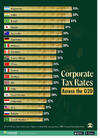- Joined
- 1 June 2013
- Posts
- 278
- Reactions
- 15
Thanks, I'm quite aware of the difference between turnover and net profit.
In fact a turnover tax (at say 10%) instead of profit tax could be a better way of collecting taxes from business.
What do you think ?
Of course.....it depends.
Are you proposing abolishing all the other taxes on companies?
I would stand back and look at my own overall position and see if it were worthwhile for myself. If I was better off as a wage slave, then I would go back to PAYG and there would be less company profit going into the pool. Other businesses would do that too.
Drastically changing the company taxation system wont happen. My personal preference would probably raising the GST if we had to put up with higher taxes - that way User Pays.
pinkboy

